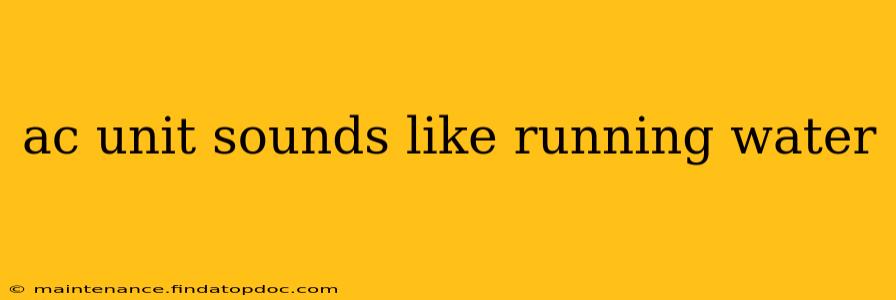Is your air conditioner making a sound like running water? This isn't normal and could indicate a few different problems, ranging from minor inconveniences to serious issues requiring professional repair. This comprehensive guide will help you diagnose the cause and find the right solution. We'll cover common causes and offer troubleshooting steps to get your AC back to its quiet, cool operation.
Why Does My AC Unit Sound Like Running Water?
The "running water" sound from your air conditioner usually stems from issues within the unit itself, often related to refrigerant or condensate drainage. Let's explore the most common culprits:
1. Refrigerant Leak: The Serious Possibility
A hissing or gurgling sound resembling running water can signal a refrigerant leak. Refrigerant is crucial for cooling, and a leak reduces efficiency and can damage the compressor. This is a serious issue requiring immediate professional attention. Ignoring a refrigerant leak can lead to significant damage and expensive repairs. Do not attempt to fix this yourself; contact a qualified HVAC technician immediately.
2. Clogged Condensate Drain Line: A Common Culprit
Air conditioners produce condensation as they cool the air. This condensate water typically drains away through a drain line. If this line becomes clogged with dirt, algae, or other debris, the water can back up, leading to gurgling or running water sounds. This is often a relatively easy fix.
3. Frozen Evaporator Coil: A Result of Clogs or Low Refrigerant
A frozen evaporator coil restricts airflow, causing ice to melt and drip, producing a running water sound. This can be caused by a restricted airflow due to a dirty air filter or a clogged condensate drain line. Low refrigerant levels can also lead to freezing. Addressing the underlying cause (clogged drain, dirty filter, or refrigerant leak) is crucial.
4. Condensation Pan Overflow: Another Drainage Problem
The condensation pan collects condensate water before it drains. If this pan overflows, it can create a running water sound. This might be caused by a clogged drain line or a pan that has shifted, preventing proper drainage.
5. Airflow Restrictions: Check Your Filters
Poor airflow, often due to a dirty air filter, can cause the evaporator coil to freeze, resulting in the melting and dripping sound. Regular filter changes are essential for preventing this issue.
Troubleshooting Steps: What Can I Do Myself?
Before calling an HVAC technician, try these simple troubleshooting steps:
How to Check and Clean the Air Filter?
Locate your air filter (usually accessible on the return air vent). If it's dirty, replace or clean it according to the manufacturer's instructions. This is a simple yet often overlooked maintenance step.
How to Check and Clean the Condensate Drain Line?
This involves accessing the drain line (usually located at the bottom of the indoor unit). Carefully remove any visible debris or clogs. A small brush or a plumbing snake might be helpful. Be careful to avoid electrical components.
How Can I Check the Condensation Pan?
Inspect the condensation pan for any obstructions or signs of overflow. Ensure it is properly positioned and draining correctly.
When to Call a Professional HVAC Technician?
If the running water sound persists after attempting these troubleshooting steps, or if you suspect a refrigerant leak, it’s crucial to contact a qualified HVAC technician. Refrigerant leaks are dangerous and require professional repair to prevent further damage and ensure your safety.
Preventing Future Problems: Regular Maintenance is Key
Regular air conditioner maintenance, including filter changes and condensate drain line cleaning, is vital for preventing many common issues, including those that produce running water sounds. Schedule professional maintenance at least once a year to catch potential problems early.
By understanding the possible causes of this issue and following the steps outlined above, you can effectively troubleshoot the problem and keep your air conditioner running smoothly and quietly. Remember that safety is paramount—don't hesitate to call a professional when necessary.
